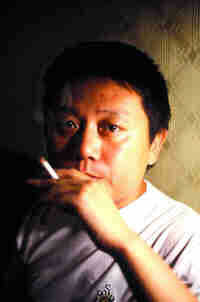| Art Q&A > Modern > links |
|
Hooligan Literature At the end of the 1980s, a kind of so-called
"hooligan literature" became fashionable in the mainland. The vulgar language,
and the completely unreasonable plot, as well as young people's idleness and
cynicism constituted the style of this literature. Wang Shuo is the leader of
"hooligan literature," with many of his novels' classic languages being used by
young people as their daily language. At the end of the 1980s, a kind of so-called
"hooligan literature" became fashionable in the mainland. The vulgar language,
and the completely unreasonable plot, as well as young people's idleness and
cynicism constituted the style of this literature. Wang Shuo is the leader of
"hooligan literature," with many of his novels' classic languages being used by
young people as their daily language.
Wang 's popularity has also brought another phenomenon; it began a new trend
of people buying a book according to the author. For many people, they will only
buy books that are written by Wang Shuo. Wang's works have obvious non-rational
tendencies, which are amoral and anti-tradition, and which indistinctly inspire
the natural consciousness. All these concepts largely catere to young people's
rebellious nature. Wang Shuo's "ruffian" spirit is obvious to all, especially when looking at his list of novels, such as Playing for Thrills, Please Don't Call me Human, and I Am Your Father. "I'm a hoodlum; who should I fear?" Wang Shuo's motto) obviously shows his stubbornness and arbitrariness. Most of Wang Shuo's novels depict the life of a pipsqueak, whose language, motion, thought, and sentiment are close to common people. Wang has no intention to act as the human spirit's guide or the Savior of the human soul. He only wants to be friends with his readers, to talk frankly with them. Using words to resonate with readers and making everybody feel good and happy are his only goals. Regardless of the significance of Wang Shuo's novels, without doubt his works provide us with the message: Novels can be written in many ways, with forms, structures, languages, and subjects that are open. Hoodlum literature has had a huge influence on forms of literature succeeding
it. Many younger authors more or less have been affected by Wang's spirit, and
they also continue to use some of his more popular phrases in their works.
|
|||||
All rights reserved. Reproduction of text for non-commercial purposes is permitted provided that both the source and author are acknowledged and a notifying email is sent to us. |
|||||
 |